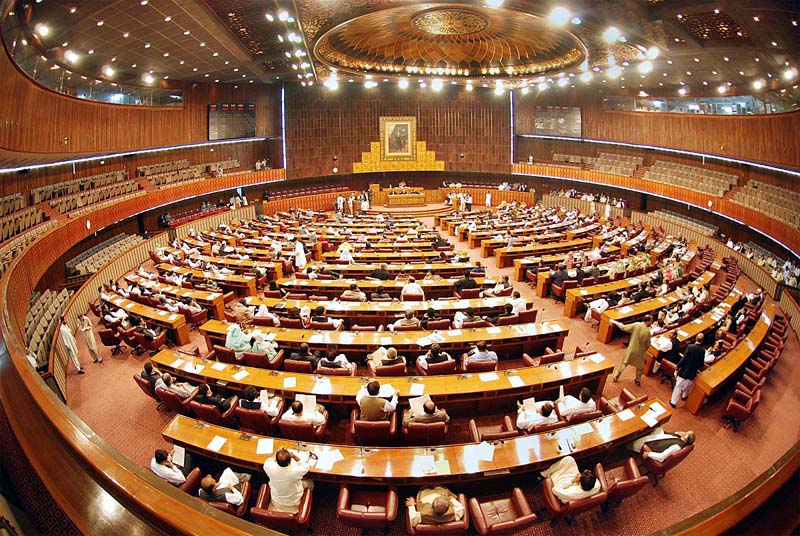
ISLAMABAD ( BMZ REPORT )
Senator Mushahid Ullah Khan, while addressing first plenary session of the Inter-Parliamentary Union World E-Parliament Assembly stated that the Government and Parliament of Pakistan have played proactive role in bringing e-parliament and e-democracy from the realm of ideas to reality being true agents of social change and robust participatory democracy in the modern age.
“Although the World e-Parliament Report lists resource constraints and lack of strategic planning and political will as key obstacles in e-enablement, we have done reasonably well on all three counts despite challenges” Mushahid Ullah remarked.
Pakistan’s Parliament on its part is also taking significant strides to digitize its in-house business and other related working, he added. He further said that the current democratic government is actively pursuing e-democracy and ICTs related goals through massive investments in education, training, and infrastructure development.
Senator Mushahi Ullah recommended to constitute a special committee mandated to address problems of the resource deficient parliaments, creation of pool of expertise and funding to help legislatures automate their activities besides developing partnerships to assist parliament struggling to develop a workflow-based system.
Senator Mushahid Ullah Khan is currently heading a 4-member delegation of the Senate which is participating in the World E-Parliament Conference from June 28 –30 , 2016 in Valparaiso, Chile. Other members of the delegation include Senators Saifullah Khan Bangash, Saeedul Hassan Mandokhel , Aurangzeb Khan Aurakzai. Secretary Senate Amjed Pervez Malik is also accompanying the delegation. Ambassador of Pakistan in Argentina Imtiaz Ahmed was also present.
Senator Mushahidullah Khan termed the World E-Parliament Report 2016 a thought provoking document having immense value for parliamentary community across both sides of the digital divide.
He said that the report highlighted the headways parliaments have made towards digitization besides pointing out specific obstacles at financial, technical, human resource, and political level hampering legislatures from fully embracing the concept of e-parliament.
“Healthy signs, showing parliaments’ increasing inclination to using technology to better deliver and better connect in a digital age have been documented as compared to the report published in 2008” Senator Mushahidullah said. He further said that ICTs offer unprecedented opportunities to learn from one another by sharing experiences.
However, he said that despite huge opportunities of sharing and developing common services, parliaments, especially in developing countries, have struggled to ensure quality and sustainability in developing their information and communication systems due to paucity of resources and technical expertise on part of both staff and Members, to inadequate political will to embrace change. He emphasized that the way forward lies in enhanced inter-parliamentary collaboration and partnerships to identify gaps, deliberate solutions and assist implementation.
He informed that efforts are being made to maintain gender balance in the IT industry with steps like keeping a minimum percentage of 30% females in all industry support programs such as internships and trainings to motivate more women to join the IT workforce.
E-enablement of Pakistan Senate, Mushahidullah said, is a key strategic, policy and operational measure being undertaken expeditiously over the last few years and plans are also under consideration to replace hard copies of bills and other documents provided to the Members during the plenary session with Tablets and laptops as a prelude to making Pakistan Senate a paperless chamber.
He underscored the need for enhanced cooperation and linkages between parliaments towards sharing experiences, pooling resources and building capacities, begetting more efficient use of cutting-edge technology in parliamentary domain. He called for investing more in making parliaments technologically advanced to act as true enablers in meeting the 2030 Agenda for Sustainable Development.
Senator Mushahidullah Khan expressed the findings of this report would help put in place better mechanisms, policies and partnerships to bridge the digital divide between parliaments. He urged the legislators to play proactive role in defining the shape of national and global information technologies.
He commended the IPU and the Chamber of Deputies of Chile for arranging this forum dedicated to ensuring effective use of technology to strengthen parliamentary and participatory democracy. He also appreciated Mr. Andy Williamson, the author for compiling a comprehensive report.

